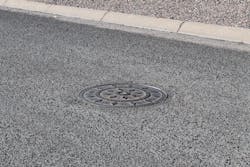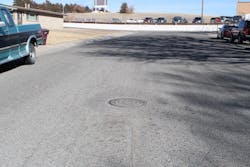No More “Radiator Wreckers”: Benkleman, Nebraska Saves Big with Better Manhole Raising Solution
Tim Smith, highway superintendent with the City of Benkleman, Nebraska (pop. about 900) has had an interesting career; he worked for the city for 24 years, then left for 12 years—“I took a job doing riparian restoration”—and then, three years ago, was asked to take his old job back. During his 12 year absence, there were a few tasks that weren’t done routinely, notably the pesky job of raising manholes and valve boxes to grade after new paving lifts. Given Benkleman’s location on the bank of the Republican River, this is critical maintenance. “Our town is built on the side of a river valley, and is very hilly,” Smith explains. “This really affects manholes. The chimneys have to be vertical, of course, but the lids often have to be canted quite a bit to match slope.” In fact, about half of Benkleman’s manholes require canted lids, and routine repaving had left most of those four inches or more below grade, creating potholes that ranged from irritating to dangerous (“radiator wreckers”), even becoming something of a town scandal.
Smith searched online for effective canted lid raising solutions, and came across the “American Highway Products Pivoted Turnbuckle Inclined Manhole Riser” and reacted strongly—“What the heck have I been doing?” This is because his preferred method of raising manholes to grade, for decades, required removal of up to ten square feet of pavement surrounding manholes, excavation, hauling, raising utility rims with new concrete, and filling around the raised manhole with new pavement. Especially on sloped streets, where sometimes a backhoe cannot be used, the process was extremely slow and labor-intensive, involving a 3-man crew and lane closures of three days, including concrete cure time.
By contrast, the American Highway Products risers are, no joke, installed in less than 30 minutes by a 2-man crew. “We just pop the lids, clean the original rims, install the inclined risers—tilted to match road slope—tighten the risers with the turnbuckle, put the lid back, and chip seal as needed”. Compared to the traditional method, “Smith is quite sure the city saves at least $1,000 per manhole, not to mention no road closures, and installed about 25 in 2021”, so… you do the math. It’s a big savings for a rural Nebraska town with population less than 1,000.
Raising valve boxes to grade on hilly roadways is also a big challenge, also involving excavation, hauling, and new pavement. And the American Highway Products valve boxes fit, which are Compression Fit, make a big difference in a hurry—“We just pound them in and they’re very secure,” say Smith.
In fact, fixes with the manhole and valve box risers have been installed for a winter now, are durable with no failures, and “They hold up to snowplows no problem—we’re really happy with them.”
So are Benkleman residents. Smith says, “One of the best results from this project to raise manholes was the immediate public feedback. Talk about a quick and easy way to get some very positive publicity! The townspeople at large were very pleased with the results—no more dodging, or bone jarring thumps.”

